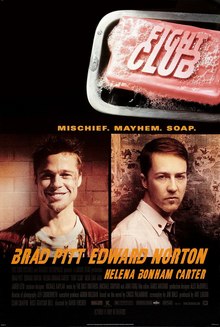Fight Club
| Fight Club | |
|---|---|

Theatrical release poster
|
|
| Directed by | David Fincher |
| Produced by |
|
| Screenplay by | Jim Uhls |
| Based on |
Fight Club by Chuck Palahniuk |
| Starring | |
| Music by | The Dust Brothers |
| Cinematography | Jeff Cronenweth |
| Edited by | James Haygood |
|
Production
companies |
|
| Distributed by | 20th Century Fox |
|
Release date
|
|
|
Running time
|
139 minutes |
| Country |
|
| Language | English |
| Budget | $63 million |
| Box office | $100.9 million |
| Actor | Role | |
|---|---|---|
| Pitt, BradBrad Pitt | as | Durden, TylerTyler Durden |
| Norton, EdwardEdward Norton | as | Narrator, TheThe Narrator |
| Carter, Helena BonhamHelena Bonham Carter | as | Singer, MarlaMarla Singer |
| Meat Loaf, Meat Loaf | as | Paulson, RobertRobert Paulson |
| Leto, JaredJared Leto | as | Angel Face, Angel Face |
Fight Club is a 1999 American film based on the 1996 novel of the same name by Chuck Palahniuk. The film was directed by David Fincher, and stars Brad Pitt, Edward Norton and Helena Bonham Carter. Norton plays the unnamed protagonist, referred to as the narrator, who is discontented with his white-collar job. He forms a "fight club" with soap maker Tyler Durden, played by Pitt, and they are joined by men who also want to fight recreationally. The narrator becomes embroiled in a relationship with Durden and a dissolute woman, Marla Singer, played by Bonham Carter.
Palahniuk's novel was optioned by 20th Century Fox producer Laura Ziskin, who hired Jim Uhls to write the film adaptation. Fincher was one of four directors the producers considered, and was selected because of his enthusiasm for the film. Fincher developed the script with Uhls and sought screenwriting advice from the cast and others in the film industry. The director and the cast compared the film to Rebel Without a Cause (1955) and The Graduate (1967). Fincher intended Fight Club's violence to serve as a metaphor for the conflict between a generation of young people and the value system of advertising. The director copied the homoerotic overtones from Palahniuk's novel to make audiences uncomfortable and keep them from anticipating the twist ending.
Studio executives did not like the film and restructured Fincher's intended marketing campaign to try to reduce anticipated losses. Fight Club failed to meet the studio's expectations at the box office and received polarized reactions from critics, who debated the explicit violence and moral ambiguity, but praised the acting, directing, themes and messages. It was cited as one of the most controversial and talked-about films of 1999. The film later found critical and commercial success with its DVD release, which established Fight Club as a cult film.
...
Wikipedia
